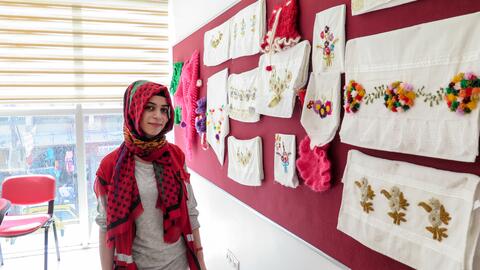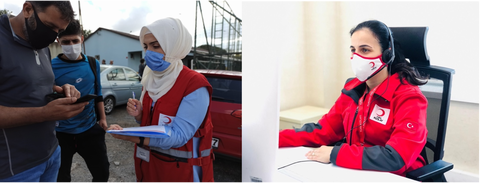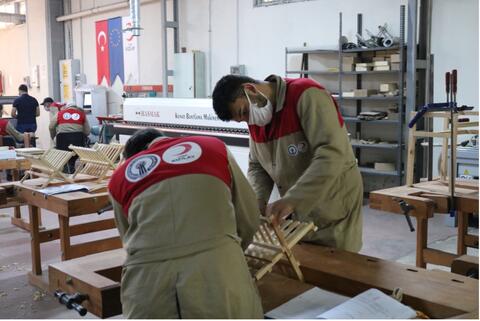The world is facing record levels of people forced to flee their homes due to violence, insecurity, and the effects of climate change (UNHCR 2021). Many cannot return home and face the new overwhelming reality to resettle and rebuild somewhere from zero. As is the case for many protracted crises, how do we face the challenge of responding to the urgent needs while also the long-term solutions to help improve lives for the years to come?
By Deniz Kacmaz, IFRC Turkey, Livelihood Officer
Turkey is hosting the largest refugee population in the world. More than 3.7 million Syrians have sought refuge as well as 330,000 under international protection and those seeking asylum, including Iraqis, Afghans, Iranians, Somalis, among others. With the conflict in Syria now entering its twelfth year with few signs of change, means that we are not just looking at a humanitarian emergency anymore, but on long-term resilience.
Since the refugee influx began in Turkey, the Turkish Red Crescent (Türk Kızılay) has been taking a leading role in the response. As of April 2020, Turkish Red Crescent through its KIZILAYKART platform and IFRC run the largest humanitarian cash programme in the world, the Emergency Social Safety Net (ESSN), funded by the EU.
This programme has helped more than 1.5 million cover some of their most basic needs, covering their groceries, rent and utilities, medicine and their children’s school supplies.
But humanitarian emergency cash assistance can only go so far. There is also a need to focus on longer-term resilience. This is why we are working on both the urgent needs of refugees, while also supporting longer-term livelihood opportunities for refugees and host communities.
From humanitarian cash to longer-term resilience
We are working on both the urgent needs of refugees, while also supporting longer-term livelihood opportunities for refugees and host communities. This means being part of the labour market to meet their own needs and rebuild their life without depending on social assistance, including the ESSN.
We must focus on long-term solutions where refugees, supported by the ESSN, gain their power to stand on their feet and become self-reliant again.
I have been working at IFRC Turkey Delegation for almost two years helping identify gaps and find opportunities to empower people’s socio-economic capacities. This approach helps ensure they are resilient in combating challenges in the future, including the devastating socio-economic impacts brought on by the COVID-19 pandemic and general obstacles around employment opportunities.
We have seen in many contexts when refugees are able to build their resilience and self-sufficiency, they can contribute even more meaningfully to the local economy. When they benefit, we all benefit, including host communities.

What are we doing to bring this long-term solution to the lives of refugees?
As of April 2021, we have launched referrals that link people receiving cash assistance through ESSN with a plethora of livelihood trainings and opportunities in Turkish Red Crescent community centres.
The 19 community centres across Turkey offer support to both refugee and host communities, including work permit support, vocational courses such as sewing; mask producing; various agricultural trainings; and Turkish language courses and skills trainings. These services are critical to breaking barriers in the local markets. The community centres connect skilled individuals to relevant job opportunities by coordinating with public institutions and other livelihood sector representatives.
The ESSN cash assistance provides support to refugees in the short term while giving them opportunities to learn new skills, which can lead to income generation in the long term.
How do we conduct referrals from the ESSN to livelihoods?

There are many sources where families are identified for referrals, some of the most common are:
- Turkish Red Crescent (Türk Kızılay) Service Centre
- 168 Kızılay Call Centre
- Direct e-mail address to the TRC referral and outreach team
- Identified potential individuals among ESSN protection cases
- Field teams including monitoring and evaluation and referral and outreach teams who are regularly engaging with those benefitting from ESSN
In the first months of combining cash assistance with longer-term programmes, we have supported more than 1,000 refugees.

Some have been referred to employment supports including consultancy for employment and work permit support, while others are attending language courses, vocational trainings, and skills development courses through public institutions, NGOs, UN agencies and TRC’s community centres.
Though we have developed a robust livelihood referral system, collectively, we need to make stronger investments in social economic empowerment in the future.
While we continue to work on improving our programming and referral mechanisms, as IFRC, we are also reaching out to agencies, civil society, donors, and authorities to look at how we can:
- increase investment in socio-economic empowerment in Turkey,
- mitigate barriers to employment for refugees, and
- create greater synergies between humanitarian and development interventions.
It is this collective effort that will deliver the longer-term gains necessary for both refugee and local communities in Turkey to thrive.
—
The ESSN is the largest humanitarian cash assistance program in the world, and it is funded by the European Union. The ESSN has been implemented nationwide in Turkey in coordination and collaboration with the Turkish Red Crescent and International Federation of Red Cross and Crescent Societies (IFRC). We reach more than 1.5 million refugees in Turkey through the ESSN, and we give cash assistance to the most vulnerable populations to make sure they meet their basic needs and live a dignified life.
The Turkish Red Crescent with its 19 community centres throughout Turkey supports millions of refugees as well as host communities. The Centres provide several courses, vocational trainings, social cohesion activities, health, psychosocial support, and protection services, among others.




